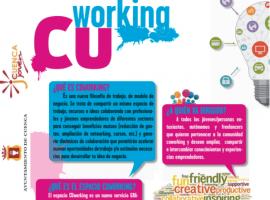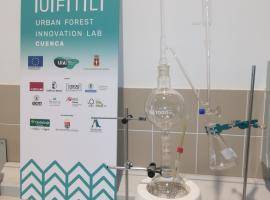When asked about the potential consequences of the COVID-19 crisis on the implementation and results of UFIL, Alvarez Torres noted that adaptation is necessary for UFIL as it is for any entrepreneur/sector. This adaptation will have to be reflected, for example, in the business plans of the trainees’ ideas which are currently nurtured in the project’s innovation lab. In addition, Alvarez Torres highlighted the importance of considering the opportunities created by the COVID-19 crisis, and in particular:
- Rural areas have now the chance to become more attractive to future entrepreneurs as as they are considered safer than urban areas.
- The need to run the training in a remote modality has emphasised the power of digitization for business idea development and this same power shall not be undervalued by trainees for future professional purposes such as reach out to potential customers, opening of new niche markets, and regular dealing with clients and suppliers.
On top of the two opportunities mentioned above, it is likely for the productive fabric of the province of Cuenca, characterised by the prevalence of SMEs and of self-employed, to be sensitive to economic fluctuations. And these fluctuations look promising in the near future due to the resources mobilised at the EU level for the social and economic recovery of territories. Spain, as one of the worst-hit countries in the EU, has been (theoretically) allocated some €140 billion in this sense. On top of this, there are novel investment initiatives and more flexibility is granted in the use of the European structural funds. Indeed, UFIL may take advantage of this unprecedent injection of resources as it finds itself well-aligned to some of the ten priorities set by Spain for the near future (source: Gobierno de España website). In fact, according to the recently presented recovery plan ‘España puede’, the project is able to contribute to at least the following national goals:
- Combating depopulation by improving both rural and urban environments.
- Investing in resilient infrastructures and ecosystems.
- Promoting renewable energy.
- Modernizing companies, including through digitization, and recovery of the tourism sector.
- Investing in human capital by supporting education and knowledge, continuous training and capacity building.
In practice, the two main opportunities which are spurring from the COVID-19 crisis are:
- The pandemic has managed to mobilise unprecedented resources that may favour those initiatives like UFIL that are aligned to the priorities set by national and regional governments for recovery and resilience. These resources include new funds but also new investment initiatives and higher flexibility in the use of the European structural funds.
- The COVID-19 pandemic has given a sort of positive label to ‘remoteness’, a condition which was so far negatively perceived by the most. In fact, remote areas have become safer places than urban areas to live and work. And remote working has turned out to be not only possible but also necessary to keep people employed and businesses alive. The City of Cuenca may take advantage of this new and positive perception.


























